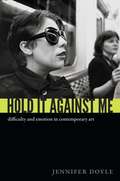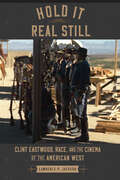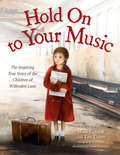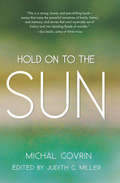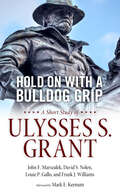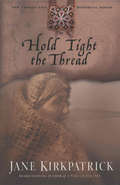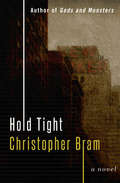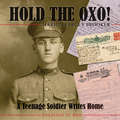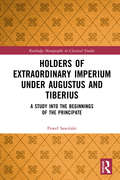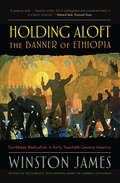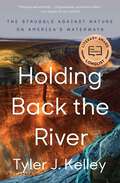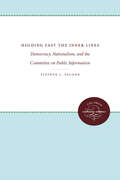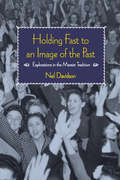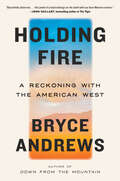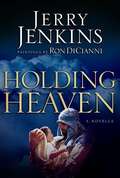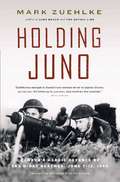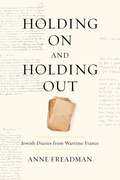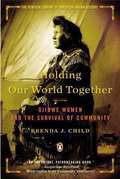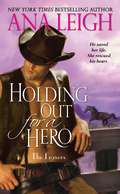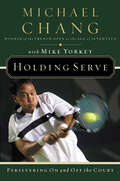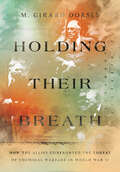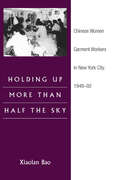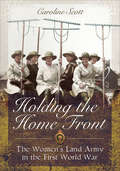- Table View
- List View
Hold It Against Me: Difficulty and Emotion in Contemporary Art
by Jennifer DoyleIn Hold It Against Me, Jennifer Doyle explores the relationship between difficulty and emotion in contemporary art, treating emotion as an artist's medium. She encourages readers to examine the ways in which works of art challenge how we experience not only the artist's feelings, but our own. Discussing performance art, painting, and photography, Doyle provides new perspectives on artists including Ron Athey, Aliza Shvarts, Thomas Eakins, James Luna, Carrie Mae Weems, and David Wojnarowicz. Confronting the challenge of writing about difficult works of art, she shows how these artists work with feelings as a means to question our assumptions about identity, intimacy, and expression. They deploy the complexity of emotion to measure the weight of history, and to deepen our sense of where and how politics happens in contemporary art. Doyle explores ideologies of emotion and how emotion circulates in and around art. Throughout, she gives readers welcoming points of entry into artworks that they may at first find off-putting or confrontational. Doyle offers new insight into how the discourse of controversy serves to shut down discussion about this side of contemporary art practice, and counters with a critical language that allows the reader to accept emotional intensity in order to learn from it.
Hold It Real Still: Clint Eastwood, Race, and the Cinema of the American West
by Lawrence P. JacksonHow did the American western feature film genre rebrand itself in the late seventies and respond to the fury of global and domestic political affairs?In Hold It Real Still, Lawrence Jackson examines Clint Eastwood's influence on the western film while also exploring how that genre continues to operate into the twenty-first century as an ideological channel for ideas about race and imperialism. Jackson argues that the western genre pivoted from an initial doctrine of racial liberalism, albeit a clumsy one, during the John Wayne years to a motile agenda of substitution, exclusion, and false equivalency during the Clint Eastwood period. The book traces how Eastwood, an actor first associated with the avant-garde, anti-colonialist discourse of "spaghetti" western cinema, reversed himself in the second half of the 1970s with The Outlaw Josey Wales—a film that had at its heart the fantasy of Black erasure from American life. Jackson situates Eastwood's work as a response to massive social and political upheavals in America: defeat in Vietnam, riots in northern cities, the civil rights movement and associated legislation, and the Great Migration, which made possible a degree of mixed-race public interaction that was impossible even as late as the 1960s. Hinged by a close reading of four blockbuster films which continue to shape discourses in cinematic arts, American liberalism, the westerns, and race relations today—The Good, the Bad and the Ugly, Josey Wales, Ride with the Devil, and Django Unchained—Jackson's unique critique flashes on the contradictory symbolic structures at work in these masterpieces. Juxtaposing the films' motifs, tropes, and hidden Black figures with historicist readings lays bare the containment strategies of the 1970s and beyond used to stymie civil rights progress and racial equity in the United States. Tackling the rise of neoracism and the domestic apparatus of surveillance, control, and erasure, Hold It Real Still offers an astonishing revision of what audiences and critics thought they understood about a uniquely American genre of film.
Hold On to Your Music: The Inspiring True Story of the Children of Willesden Lane
by Mona Golabek Lee CohenDiscover the inspiring illustrated true story about one girl's escape from the Holocaust to become a concert pianist against all odds, made popular by the beloved novel The Children of Willesden Lane.In pre-World War II Vienna, Lisa Jura was a musical prodigy who dreamed of becoming a concert pianist. But when enemy forces threatened the city—particularly the Jewish people that lived there—Lisa's parents were forced to make a difficult decision. They chose to send Lisa to London for safety through the Kindertransport—a rescue effort that relocated Jewish children. As Lisa yearned to be reunited with her family while living in a home for refugee children on Willesden Lane, her music became a beacon of hope for those around her.A true story of courage, survival, and determination, this compelling tribute to a gifted young girl has already touched the lives of many around the world. Originally published in 2017 for older readers, The Children of Willesden Lane has sold hundreds of thousands of copies globally; now this picture book retelling will inspire a new generation.
Hold On to the Sun
by Michal GovrinThe Israeli author&’s poetry, essays, and stories on the haunting legacy of WWII &“swirl mystically out of history and into dazzling floods of wonder&” (Don DeLillo, author of White Noise). In this portrait of the artist as a young woman, one of Israel&’s most acclaimed contemporary writers weaves together a kaleidoscope of fiction, poetry, and essays. Populated by both fictional and real people, each tale is in some way a search for meaning in a post-Holocaust world. Reminiscent of W.G. Sebald, characters irrationally and humanely find reason for hope in a world that offers little. Essays describe Govrin&’s visits to Poland as a young adult, where her mother had survived a death camp, but had lost her husband and their child, Govrin&’s half-brother. Capturing the depths of denial and the exuberance of youth in a multiplicity of voices, this haunting collection &“joins the few serious books that try through artistic means to face the unspeakable&” (Aharon Appelfield, author of Badenheim 1939).
Hold On with a Bulldog Grip: A Short Study of Ulysses S. Grant
by John F. Marszalek Frank Williams David Nolen Louie GalloIn this new short biography of Ulysses S. Grant, leading scholars provide an accessible introduction to Grant and his legacy. Grant led Federal forces to victory in the Civil War, was the first modern American president, and authored his memoirs, which would eventually become one of the greatest books of nonfiction by an American author. The authors present a thematic exploration of Grant, providing the necessary insight to appreciate Grant and correct the myths that for too long clouded his true importance. They highlight specific moments or relationships in Grant’s life—including his connection to such key figures as Abraham Lincoln and Mark Twain—and elaborate on the more controversial elements of Grant’s legacy, such as accusations about his drinking and corruption during the Grant presidency. Not to overlook his military accomplishments, they devote time to the study of Grant’s war strategy and military career, beginning as early as his reluctant enrollment into West Point. From humble birth to tragic death, this new take on Ulysses S. Grant instills readers with a deeper understanding of the military legend’s nuanced personal history and an appreciation for the late president’s tragic and triumphant story.
Hold Tight the Thread (Tender Ties #3)
by Jane KirkpatrickBASED ON A TRUE STORY In a land occupied by foreign powers and torn by confusion and conflict, a mother seeks to weave her family and her past into a fabric that will not tear. Their Lives Were Woven by Wars and Wilderness Places, and Tied by the Peace of Family and Faith. As the 1840s bring conflict to the Pacific Northwest's rugged Columbia Country, new challenges face Marie Dorion Venier Toupin: the wife, mother, and Ioway Indian woman who crossed the Rocky Mountains with the Astor Expedition, the first big fur trapping expedition after Lewis and Clark's. On French Prairie in the newly forming Oregon Territory, Marie strives to meet the needs of her conflict-ridden neighbors: British settlers and Americans, missionaries and disease-stricken natives, fur trappers and French Canadian farming families, and the surviving natives of the region. At the same time, as a mother, Marie must weave together the threads of an unraveling family. One daughter compares and judges as she seeks to find her place; another reaches for elusive evidence of her mother's love. Marie's memories are threatened with the emergence of a figure from the past. In the midst of this turmoil, Marie discovers an empowering spiritual truth: Unconditional love can shed light on even the darkest places in the heart.
Hold Tight: A Novel
by Christopher BramDuring World War II, a gay navy sailor works undercover to catch Nazi spies, in this &“fast-moving&” novel from the author of Gods and Monsters (Publishers Weekly). During shore leave in New York, Seaman Second Class Hank Fayette, a Texas country boy in the big city, finds himself visiting a gay brothel, where he is swiftly arrested during a raid. Facing the prospect of a dishonorable discharge—or worse—he is given another option: Return to the brothel, near Manhattan&’s West Side piers, and work undercover as a prostitute. Nazi agents are rumored to haunt the area, and Hank is a perfect lure to trap them. This military man is about to risk his life for his country in a way he never expected in &“a spy thriller that breaks new ground&” from the author of Eminent Outlaws and The Notorious Dr. August (Kirkus Reviews).
Hold the Oxo!: A Teenage Soldier Writes Home
by Marion Fargey BrookerShort-listed for the 2014 Forest of Reading - White Pine Award for Non-Fiction Canada was young during the First World War, and with as many as 20,000 underage soldiers leaving their homes to join the war effort, the country’s army was, too. Jim, at 17, was one of them, and he penned countless letters home. But these weren’t the writings of an ordinary boy. They were the letters of a lad who left a small farming community for the city on July 15, 1915, a boy who volunteered to serve with the 79th Queen’s Own Cameron Highlanders. Jim’s letters home gloss over the horrors of war, focusing instead on issues of the home front: of harvesting, training the horses, and the price of hogs. Rarely do these letters, especially those to his mother and father, mention the mud and rats, the lice and stench of the trenches, or the night duty of cutting barbed wire in no man’s land. For 95 years his letters remained in a shoebox decorated by his mother. Jim was just 18 when he was wounded and died during the Battle of the Somme. Hold the Oxo! tells the story that lies between the lines of his letters, filling in the historical context and helping us to understand what it was like to be Jim.
Holden vs Ford Commemorative Edition
by Steve BedwellCelebrates Australia's greatest automotive rivalry.Holden versus Ford, Ford versus Holden, Red versus Blue, Blue versus Red. Even the order in which you say these two precious words marks you for life as to which side of the white line you drive on. Going straight to the heart of what it means to be Australian, this book is a must-have addition to any Ford or Holden lover's bookshelf. Loyalty, faith, competition and love is expressed through two brands of motor car. Never before has this nation-dividing topic been faced head on, and written about in such a detailed and humorous way. Holden vs Ford: Commemorative Edition includes a comprehensive list of all the Ford and Holden models released since the beginning of the twentieth century to the mid-1980s. It covers everything from the panel van craze during the 1970s to the Great Race at Philip Island, Mt Panorama and the glory days of other Ford versus Holden racing victories. With over 300 photos and great design! Holden v Ford is a full-throttle car book and the perfect Father s Day gift book.
Holders of Extraordinary imperium under Augustus and Tiberius: A Study into the Beginnings of the Principate (Routledge Monographs in Classical Studies)
by Paweł SawińskiThis volume focuses on special military and diplomatic missions in various provinces of the Empire that Augustus and Tiberius entrusted to selected members of the domus Augusta, granting them special prerogatives (imperia extraordinaria). Sawiński compares and analyses various primary and secondary sources exploring special powers and missions in the provinces of the domus Augusta during the reigns of Augustus and Tiberius, from 27 BC to AD 23, from border regions on the Rhine and the Danube to client states such as Judaea and Armenia. It explores the legal aspects of these powers wielded in the provinces and how these missions and the subsequent honours helped to solidify power within a new hereditary system of power. The reader will also find in it a critical discussion of the current state of research on this subject. Holders of Extraordinary Imperium under Augustus and Tiberius offers an important study of these powers and prerogatives of the imperial family that will be of interest to anyone working on the Augustan age, the early Empire and Principate, and the Roman imperial family. This volume should also prove useful to students of archaeology and art history.
Holding Aloft the Banner of Ethiopia: Caribbean Radicalism in Early-Twentieth Century America
by Winston JamesA major history of the impact of Caribbean migration to the United States. Marcus Garvey, Claude McKay, Claudia Jones, C.L.R. James, Stokely Carmichael, Louis Farakhan—the roster of immigrants from the Caribbean who have made a profound impact on the development of radical politics in the United States is extensive. In this magisterial and lavishly illustrated work, Winston James focuses on the twentieth century&’s first waves of immigrants from the Caribbean and their contribution to political dissidence in America. Examining the way in which the characteristics of the societies they left shaped their perceptions of the land to which they traveled, Winston James draws sharp differences between Hispanic and English-speaking arrivals. He explores the interconnections between the Cuban independence struggle, Puerto Rican nationalism, Afro-American feminism, and black communism in the first turbulent decades of the twentieth century. He also provides fascinating insights into the impact of Puerto Rican radicalism in New York City and recounts the remarkable story of Afro-Cuban radicalism in Florida.
Holding Back the River: The Struggle Against Nature on America's Waterways
by Tyler J. KelleyA revelatory work of reporting on the men and women wrestling to harness and preserve America&’s most vital natural resource: our rivers.The Mississippi. The Missouri. The Ohio. America&’s great rivers are the very lifeblood of our country. We need them for nourishing crops, for cheap bulk transportation, for hydroelectric power, for fresh drinking water. Rivers are also part of our mythology, our collective soul; they are Mark Twain, Led Zeppelin, and the Delta Blues. But as infrastructure across the nation fails and climate change pushes rivers and seas to new heights, we&’ve arrived at a critical moment in our battle to tame these often-destructive forces of nature. Tyler J. Kelley spent two years traveling the heartland, getting to know the men and women whose lives and livelihoods rely on these tenuously tamed streams. The result, Holding Back the River, is a deeply human exploration of how our centuries-long dream of conquering and shaping this vast network of waterways squares with the reality of an indomitable natural world. On the Illinois-Kentucky border, we encounter Luther Helland, master of the most important—and most decrepit—lock and dam in American. This old dam, at the tail end of the Ohio River, was scheduled to be replaced in 1998, but twenty years and $3 billion later, its replacement still isn&’t finished. As the old dam crumbles and commerce grinds to a halt, Helland and his team must risk their lives, using steam-powered equipment and sheer brawn, to raise and lower the dam as often as ten times a year. In Southeast Missouri, we meet Twan Robinson, who lives in the historically Black village of Pinhook. As a super-flood rises on the Mississippi, she learns from her sister that the US Army Corps of Engineers is going to blow up the levee that stands between her home and the river. With barely enough notice to evacuate her elderly mother and pack up a few of her own belongings, Robinson escapes to safety only to begin a nightmarish years-long battle to rebuild her lost community. Atop a floodgate in central Louisiana, we&’re beside Major General Richard Kaiser, the man responsible for keeping North America&’s greatest river under control. Kaiser stands above the spot where the Mississippi River wants to change course, abandoning Baton Rouge and New Orleans, and following the Atchafalaya River to the sea. The daily flow of water from one river to the other is carefully regulated, but something else is happening that may be out of Kaiser and the Corps&’ control. America&’s infrastructure is old and underfunded. While our economy, society, and climate have changed, our levees, locks, and dams have not. Yet to fix what&’s wrong will require more than money. It will require an act of imagination. Meticulously researched and as lively as it is informative, Holding Back the River brings us into the lives of the Americans who grapple with our mighty rivers and, through their stories, suggests solutions to some of the century&’s greatest challenges.
Holding Fast the Inner Lines: Democracy, Nationalism, and the Committee on Public Information (Supplementary Volumes to The Papers of Woodrow Wilson)
by Stephen L. VaughnThe Committee on Public Information, the major American propaganda agency during World War I, attracted a wide range of reform-oriented men and women who tried to generate enthusiasm for Wilson's international and domestic ideals. Vaughn shows that the CPI encouraged an imperial presidency, urged limits on free speech and called for an almost mystical attachment to the nation, but it also tried to present dispassionately the causes of American intervention in the war.Originally published in 1980.A UNC Press Enduring Edition -- UNC Press Enduring Editions use the latest in digital technology to make available again books from our distinguished backlist that were previously out of print. These editions are published unaltered from the original, and are presented in affordable paperback formats, bringing readers both historical and cultural value.
Holding Fast to an Image of the Past
by Neil DavidsonDavidson explores classic themes in historical materialism as he explains: the moments of transition from the dominance of one mode of production to another; the process of social revolution which accompany these transitions; and the problem of nationalism, both as a theoretical challenge to Marxism's capacity for historical explanation and as a practical obstacle to socialist consciousness.
Holding Fire: A Reckoning with the American West
by Bryce AndrewsFrom the award-winning author of Down from the Mountain, a memoir of inheritance, history, and one gun’s role in the violence that shaped the American West—and an impassioned call to forge a new way forwardBryce Andrews was raised to do no harm. The son of a pacifist and conscientious objector, he moved from Seattle to Montana to tend livestock and the land as a cowboy. For a decade, he was happy. Yet, when Andrews inherited his grandfather’s Smith & Wesson revolver, he felt the weight of the violence braided into his chosen life. Other white men who’d come before him had turned firearms like this one against wildlife, wilderness, and the Indigenous peoples who had lived in these landscapes for millennia. This was how the West was “won.” Now, the losses were all around him and a weapon was in his hand.In precise, elegiac prose, Andrews chronicles his journey to forge a new path for himself, and to reshape one handgun into a tool for good work. As waves of gun violence swept the country and wildfires burned across his beloved valley, he began asking questions—of ranchers, his Native neighbors, his family, and a blacksmith who taught him to shape steel—in search of a new way to live with the land and with one another. In laying down his arms, he transformed an inherited weapon, his ranch, and the arc of his life.Holding Fire is a deeply felt memoir of one Western heart’s wild growth, and a personal testament to how things that seem permanent—inheritance, legacies of violence, forged steel—can change.
Holding Heaven
by Jerry B. JenkinsFrom the book jacket: Only the expert storytelling of world-famous Left Behind author Jerry B. Jenkins could take history's best-known account and retell it in a way that rivets our attention and grips our hearts. From his pen, and the brush of artist Ron DiCianni, comes this touching two-part novella featuring dual cameos of Joseph and Jesus--early and late in the years they shared as father and son. Holding Heaven offers a fresh perspective on the mysteries of the Incarnation-what it must have been like for the Son of God to walk this earth as a man, and for Joseph to raise ,this son he knew belonged first to Heaven. As you turn these pages, you will relish Jenkins' fresh telling of this beloved relationship. And when you savor the poignancy of the love that linked this father and son, you will be filled with a renewed appreciation for what your heavenly Father has done to His one and only Son, Jesus.
Holding Juno
by Mark ZuehlkeFollowing his national best-seller, Juno Beach, and with his usual verve and narrative skill, historian Mark Zuehlke chronicles the crucial six days when Canadians saved the vulnerable beachheads they had won during the D-Day landings. D-Day ended with the Canadians six miles inland - the deepest penetration achieved by Allied forces during this longest day in history. But for all the horror endured on June 6 every soldier knew the worst was yet to come. The Germans began probing the Canadian lines early in the morning of June 7 and shortly after dawn counter attacked in force. The ensuing six days of battle was to prove bloodier than D-Day itself. Although battered and bloody, the Canadians had held their ground and made it possible for the slow advance toward Germany and eventual Allied victory to begin.Holding Juno recreates this pivotal battle through the eyes of the soldiers who fought it, with the same dramatic intensity and factual detail that made Juno Beach, in the words of Quill & Quire reviewer Michael Clark, "the defining popular history of Canada's D-Day battle."
Holding On and Holding Out: Jewish Diaries from Wartime France
by Anne FreadmanExamining the diary as a particular form of expression, Holding On and Holding Out provides unique insight into the experiences of Jews in France during the Second World War. Unlike memoirs and autobiographies that reconstruct particular life stories or events, diaries record daily events without the benefit of retrospect, describing events as they unfold. Holding On and Holding Out assesses how individuals used diaries to record their daily life under persecution, each waiting for some end with a mix of hope and despair. Some used the diary to bear witness not only to the terror of their own lives, but also to the lives and suffering of others. Others used their writing as a memorial to people who were killed. All used their writing to assert: "I live, I will have lived." Holding On and Holding Out follows the diaries of two specific individuals, Raymond-Raoul Lambert and Benjamin Schatzman, from their first entry to the last one they wrote before they disappeared into the Nazi extermination camps. The author concludes the book by considering how reflections on their experience are informed by the times in which they lived, before the advent of persecution.
Holding Our World Together: Ojibwe Women and the Survival of Community
by Brenda J. ChildA groundbreaking exploration of the remarkable women in Native American communities. Too often ignored or underemphasized in favor of their male warrior counterparts, Native American women have played a more central role in guiding their nations than has ever been understood. Many Native communities were, in fact, organized around women's labor, the sanctity of mothers, and the wisdom of female elders. In this well-researched and deeply felt account of the Ojibwe of Lake Superior and the Mississippi River, Brenda J. Child details the ways in which women have shaped Native American life from the days of early trade with Europeans through the reservation era and beyond. The latest volume in the Penguin Library of American Indian History, Holding Our World Together illuminates the lives of women such as Madeleine Cadotte, who became a powerful mediator between her people and European fur traders, and Gertrude Buckanaga, whose postwar community activism in Minneapolis helped bring many Indian families out of poverty. Drawing on these stories and others, Child offers a powerful tribute to the many courageous women who sustained Native communities through the darkest challenges of the last three centuries. .
Holding Out for a Hero
by LeighThe fifth charming historical romance in bestselling author Ana Leigh's Frasers series set in the Old West "filled with biting repartee, charming characters, and the love of family" (Romantic Times). After his mother is brutally attacked, Rico Fraser seeks vengeance. In hot pursuit of Ben Slatter and his gang, he heads to Arizona, where he learns that Slatter has raided a ranch and kidnapped the owner's daughter, Jennifer. Rico follows a trail deep into the mountains, finds Slatter's camp, and rescues Jennifer. When Slatter escapes in the confusion, Rico accepts a job protecting Jennifer. But instead of drawing Slatter out of hiding, Rico finds himself unexpectedly drawn to Jennifer, putting his mission of revenge--as well as his own heart--in jeopardyow at all costs find room in his heart for love?
Holding Serve: Persevering On and Off the Court
by Mike Yorkey Michael ChangOften characterized as David facing Goliath on the tennis court, at 5'9" and 150 pounds Michael Chang is used to playing with the big hitters. What he lacks in stature, he makes up for in determination. A serious contender at any Grand Slam event, his bold statement of faith in God makes him a role model we can all look up to. "What's nice," Michael says, "is that, as long as my priorities are straight, I'm able to go out with the mentality to really leave the winning and losing up to the Lord." In Holding Serve readers get a unique glimpse at Team Chang, Michael's powerful family unit that he credits with much of his success. Michael also shares the story of how he became a Christian and the central role his faith has played in his achievements.
Holding Their Breath: How the Allies Confronted the Threat of Chemical Warfare in World War II (Battlegrounds: Cornell Studies in Military History)
by M. Girard DorseyHolding Their Breath uncovers just how close Britain, the United States, and Canada came to crossing the red line that restrained chemical weapon use during World War II. Unlike in World War I, belligerents did not release poison gas regularly during the Second World War. Yet, the looming threat of chemical warfare significantly affected the actions and attitudes of these three nations as they prepared their populations for war, mediated their diplomatic and military alliances, and attempted to defend their national identities and sovereignty.The story of chemical weapons and World War II begins in the interwar period as politicians and citizens alike advocated to ban, to resist, and eventually to prepare for gas use in the next war. M. Girard Dorsey reveals, through extensive research in multinational archives and historical literature, that although poison gas was rarely released on the battlefield in World War II, experts as well as lay people dedicated significant time and energy to the weapon's potential use; they did not view chemical warfare as obsolete or taboo. Poison gas was an influential weapon in World War II, even if not deployed in a traditional way, and arms control, for various reasons, worked. Thus, what did not happen is just as important as what did. Holding Their Breath provides insight into these potentialities by untangling World War II diplomacy and chemical weapons use in a new way.
Holding Up More Than Half the Sky: Chinese Women Garment Workers in New York City, 1948-92
by Xiaolan BaoIn 1982, twenty thousand Chinese American garment workers--mostly women--went on strike in New York's Chinatown and forced Chinese garment industry employers in the city to sign a union contract. In this pioneering study, Xiaolan Bao penetrates to the heart of Chinese American society to explain how this militancy and organized protest, seemingly so at odds with traditional Chinese female behavior, came about. Blending poignant and dramatic personal stories culled from over a hundred interviews with a detailed history of the garment industry, Chinese immigrant labor, and the Chinese community in New York, Bao shows how the participation of married women in wage-earning labor outside the home profoundly transformed their image and relationships.
Holding Up More Than Half the Sky: Chinese Women Garment Workers in New York City, 1948-92 (Asian American Experience)
by Xiaolan BaoIn 1982, 20,000 Chinese-American garment workers—most of them women—went on strike in New York City. Every Chinese garment industry employer in the city soon signed a union contract. The successful action reflected the ways women's changing positions within their families and within the workplace galvanized them to stand up for themselves. Xiaolan Bao's now-classic study penetrates to the heart of Chinese American society to explain how this militancy and organized protest, seemingly so at odds with traditional Chinese female behavior, came about. Drawing on more than one hundred interviews, Bao blends the poignant personal stories of Chinese immigrant workers with the interwoven history of the garment industry and the city's Chinese community. Bao shows how the high rate of married women employed outside the home profoundly transformed family culture and with it the image and empowerment of Chinese American women. At the same time, she offers a complex and subtle discussion of the interplay of ethnic and class factors within New York's garment industry. Passionately told and prodigiously documented, Holding Up More Than Half the Sky examines the journey of a community's women through an era of change in the home, on the shop floor, and walking the picket line.
Holding the Home Front: The Women's Land Army in the First World War
by Caroline ScottAn &“insightful and extensive&” history of the women who took over agricultural duties in England during World War I (Sussex Living Magazine). One could be forgiven for supposing that the story of the Women&’s Land Army starts in 1939 during World War II. But it&’s a much older and more complicated history . . . British agricultural policy during the First World War was held up as a success story; domestic food production was higher at the end of the war than at the start, the average calorific value of the British diet barely changed, and bread never had to be rationed. As the press reported starvation and food riots overseas, the 1918 harvest was held up as &“one of the great achievements of the War.&” In 1917, at the darkest hour, when Britain&’s food security looked most precarious, it was said that, &“if it were not for the women agriculture would be absolutely at a standstill on many farms.&” Using previously unpublished accounts and photographs, this book is an attempt to understand how the return of women to the fields and farmyards impacted agriculture—and, in turn, an examination of how that experience affected them. &“Caroline&’s wonderful book sets the record straight with beautiful illustrations and witting testimony from people who were there and saw how hard these wonderful women worked to keep Britain going during their darkest hours. Superb.&” —Books Monthly &“This is a well-researched history of the British Women&’s Land Army in WW1 and how it paved the way for the success of the WLA in the Second World War.&” —World War One Illustrated
